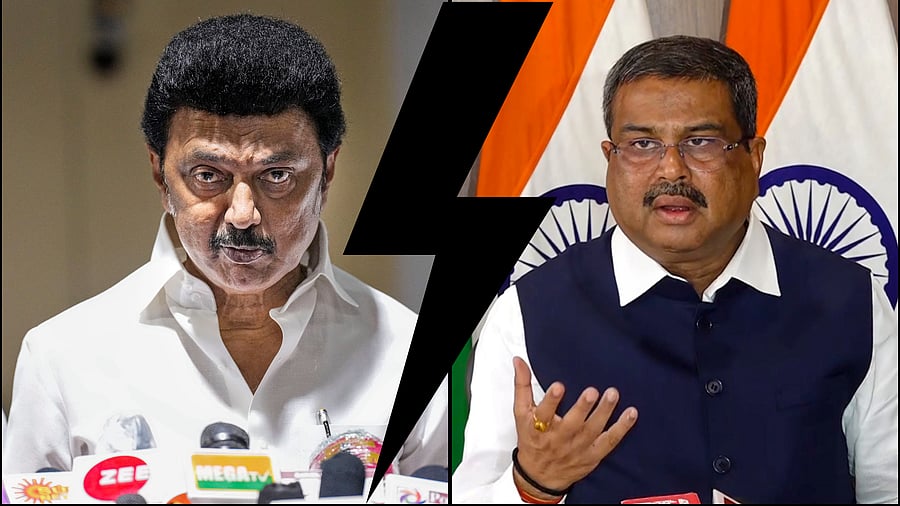
Image showing Tamil Nadu CM M K Stalin and Union Education Minister Dharmendra Pradhan.
Credit: PTI File Photos
New Delhi: Chaudhary Charan Singh, former Prime Minister, is credited with engineering the first mass defection in the history of Independent India. In 1967, he split the Congress in Uttar Pradesh to become the chief minister with support from Jana Sangh. In lieu, the BJP's pre-Emergency avatar was offered deputy chief ministership and key ministries.
Nanaji Deshmukh, the RSS pracharak and key negotiator for the Sangh, turned down Singh’s offer of plum portfolios like finance and PWD. Sangh instead chose education and culture. Their priorities were clear then, now, and in between.
The 'Indianisation' of education has remained at the core of RSS's cultural nationalism. It's as intrinsic as the Ram Temple Movement or the abrogation of Article 370. Murli Manohar Joshi was hand-picked by his teacher at Allahabad University and RSS chief Rajendra Singh or Rajju Bhaiyya to head the Human Resource Development Ministry during Vajpayee’s NDA.
Joshi had his share of run-ins with Marxist historians who accused the RSS poster boy of 'saffronisation of education'. "Saffron is our colour," Vajpayee retorted defending his minister. "Do you expect (Murli Manohar) Joshi Ji to paint education green instead?" he asked.
In 2014, when the BJP won a majority of its own under Narendra Modi, RSS expected tangible transformations. Disappointed with the progress, Sarganghchalak Mohan Bhagwat in his 2018 Vijayadashami address sounded the warning bell.
Enact a law to pave the way for the construction of the Ram Temple at Ayodhya, he demanded while expressing disappointment at the slow progress in the implementation of a New Education Policy that was billed to replace the one drafted during Rajiv Gandhi's tenure as the prime minister.
But the government of the day is not merely guided by the emotional quotient of its ideological mentor. Hard political calculations are factored in, especially if one is dealing with a policy framework that could have larger ramifications.
Language is identity — the world over and in India. The first reorganisation of states was done on linguistic lines.
In Modi 1.0, the NEP draft report was prepared by a panel headed by former ISRO chief K Kasturirangan. The recommendations were reportedly revised to remove mention of Hindi as the mandatory third language till class 8 in non-Hindi-speaking states. Though adopted by the Center, its implementation was delayed in the wake of Covid-19.
Between 2014 and 2021, the BJP experimented with three HRD ministers — Smriti Irani, Prakash Javdekar and Ramesh Pokhariyal Nishank. The reins and responsibility of implementing one of RSS’s pet projects was finally handed over to Dharmendra Pradhan.
Pradhan's father, Debendra Pradhan, was a minister in the Vajpayee government. Pradhan junior had risen to the ranks from student politics in Odisha.
Nitin Gadkari drafted him into his team and made a national general secretary when the RSS effected an overhaul in the central unit after BJP’s 2009 drubbing under LK Advani’s leadership.
When the BJP assumed office in 2014 under Modi with a clear mandate, Pradhan held key portfolios like Skill Development, Steel and Petroleum. Appointed as the education minister in the 2021 rejig, he has since been at the helm of NEP implementation.
"And more importantly, he had his moorings firmly in the ABVP, the students' wing of the RSS," says a leader closely associated with one of the Sangh social-cultural wings.
Education, and its earlier avatar the Human Resource Development Ministry, by its very nature, has a political outlook. From MM Joshi to Arjun Singh, ministers entrusted to hold the fort have been mandated to oversee ideological expansion. As such, run-ins with the Opposition are often acrimonious.
As education minister, this is the first time Pradhan has been drawn into a verbal duel concerning his department on an overarching policy issue: Opposition to the implementation of the National Education Policy by Tamil Nadu.
The state Chief Minister M K Stalin has raised a war cry in the "battle for language and fight against delimitation". Tagging a recent statement by the Pradhan in Varanasi to his social media post, Stalin alleged denial of central funds to TN for not implementing the three-language policy.
With elections round the corner, there is a method to DMK’s aggression. The escalation from the Centre has, however, been a little surprising.
Pradhan has said Stalin's criticism of NEP is a ruse to divert attention from "governance failure". But politically speaking, does it suit the BJP to join issues which have sparked massive mobilisation in the past? It's a confrontation that comes at the risk of political isolation in the southern state where the saffron brigade has been making assiduous attempts to emerge as an alternative.
Irrespective of the party in power, the Centre, apprehensive of the erosion to its political authority, is a tad reluctant to grant exceptions and omissions to an overarching national policy. But, if the political cost is high, discretion is often the better part of valour.
Or is it that the BJP assesses a perceptible change in the current socio-political milieu in Tamil Nadu from the 1960s? So much so that the ruling party at the Centre feels in an internet-connected world, the economic and aspirational quotient overrides regional and linguistic identities that defined political preferences in the past.